Best External Graphics Cards For Laptops
Laptops are supposed to be compact and lightweight portable machines and are not necessarily the most powerful gaming rigs. Since laptops can’t accommodate full-size graphics cards like an RTX 3080 in their chassis, you will need to make use of one of the best external graphics cards that are available on the market. Sure, you carry a laptop around every day for doing some studying, preparing a presentation, or watching TV shows or movies using. But what if you want to play games? As a lot of new games require a lot of raw power, an eGPU out of our roundup of all the external graphics cards out there. We will consider all eGPU Buying factors, as such, its price, performance, design, versatile ratio, and specifications. So stick around if you going for shopping.
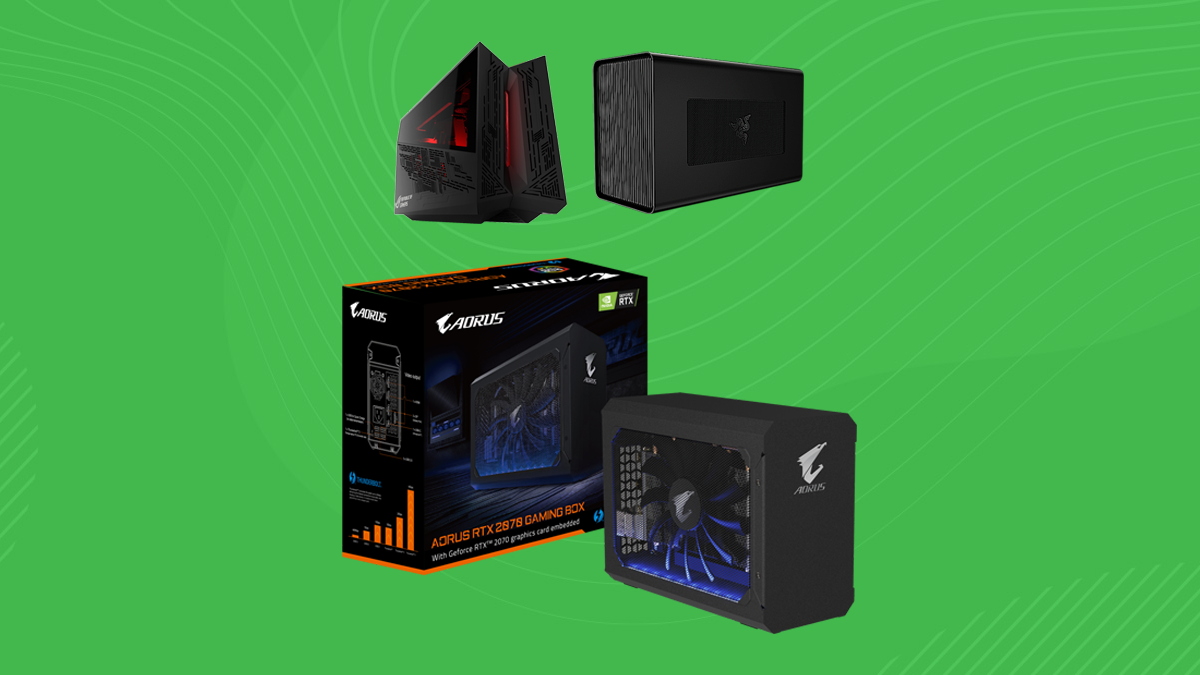
This makes gaming laptops big and heavy, which defeats the purpose of portability. Some might even question if gaming laptops are worth it . But what if you want a portable laptop that you carry around every day and also do some serious gaming on it? Well a few years ago that would have been a laughable dream but thanks to external graphics card enclosures, portable gaming is easier than ever.
Best External Graphics Cards You Can Buy Today
| # | Preview | Model | Award | Details |
|---|---|---|---|---|
| 1 | 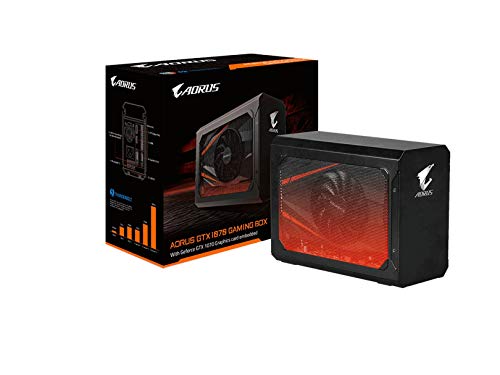 | Gigabyte Aorus Gaming Box | Best Overall eGPU | Check Price |
| 2 | 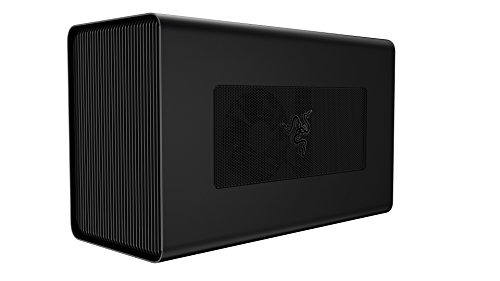 | Razer Core X | Best Performing eGPU | Check Price |
| 3 | 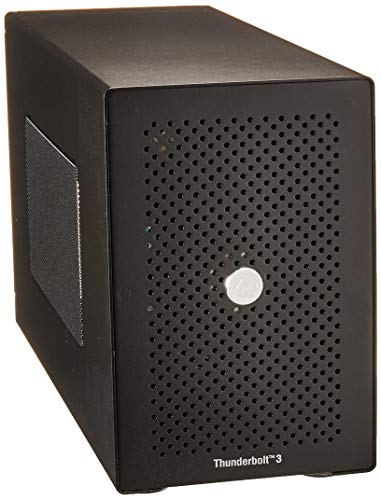 | Akitio Node | Most Versatile eGPU | Check Price |
| 4 | 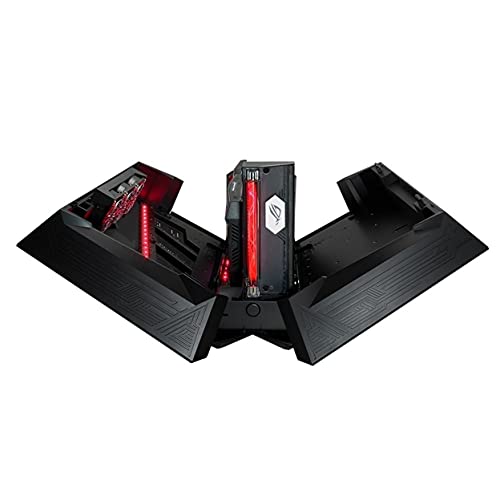 | Asus ROG XG Station 2 | Best Looking eGPU | Check Price |
| 5 | 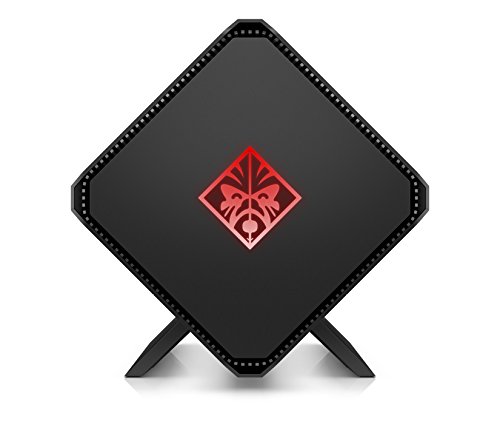 | HP OMEN Accelerator | Most Feature-Rich eGPU | Check Price |
| # | 1 |
| Preview |  |
| Model | Gigabyte Aorus Gaming Box |
| Award | Best Overall eGPU |
| Details | Check Price |
| # | 2 |
| Preview |  |
| Model | Razer Core X |
| Award | Best Performing eGPU |
| Details | Check Price |
| # | 3 |
| Preview |  |
| Model | Akitio Node |
| Award | Most Versatile eGPU |
| Details | Check Price |
| # | 4 |
| Preview |  |
| Model | Asus ROG XG Station 2 |
| Award | Best Looking eGPU |
| Details | Check Price |
| # | 5 |
| Preview |  |
| Model | HP OMEN Accelerator |
| Award | Most Feature-Rich eGPU |
| Details | Check Price |
Last Update on 2024-10-23 at 07:41 / Affiliate links / Images from Amazon Product Advertising API
Choosing the best external graphics card is a bit of a challenge due to the various factors that one might have to consider while buying one. External graphics cards are known to be quite finicky and hard to set up, so it is in your best interest to research extensively beforehand about the various types of eGPUs available, especially since some require a purchase of a graphics card separately which might be difficult in a time of GPU shortage. l
1. Gigabyte Aorus Gaming Box
Best Overall eGPU
Pros
- Supports Quick Charge
- RGB Fusion
- Sturdy Build
- High-End GPU Already Equipped
- Good Selection of AMD and Nvidia GPUs
Cons
- Limited Upgradeability
- Only Supports Compact Cards
GPU support: Graphics card included (GTX 1070, 1080, RX580) | Connectivity: Thunderbolt 3 | Power Supply: 450W | Weight: 4.42 pounds
The Gigabyte Aorus Gaming Box is a very straightforward external graphics card solution. Unlike other external graphics card enclosures, this one actually includes a graphics card inside. There are different variants available ranging from a Radeon RX 580, GTX 1070, and GTX 1080. We’ll be having a look at the 1070 version here as it jumps out as the best value.
This is one of the smallest graphics card enclosures around. It’s aptly named the Gaming Box as its design is pretty minimal and straightforward. That doesn’t mean it looks bad by any means. It’s a small enclosure made of matte black aluminum with mesh panels on the sides for your GPU to breathe. It takes up very little space on your desk and is actually pretty portable because it comes with a carrying case. There’s also RGB lighting here on the mesh side panel.
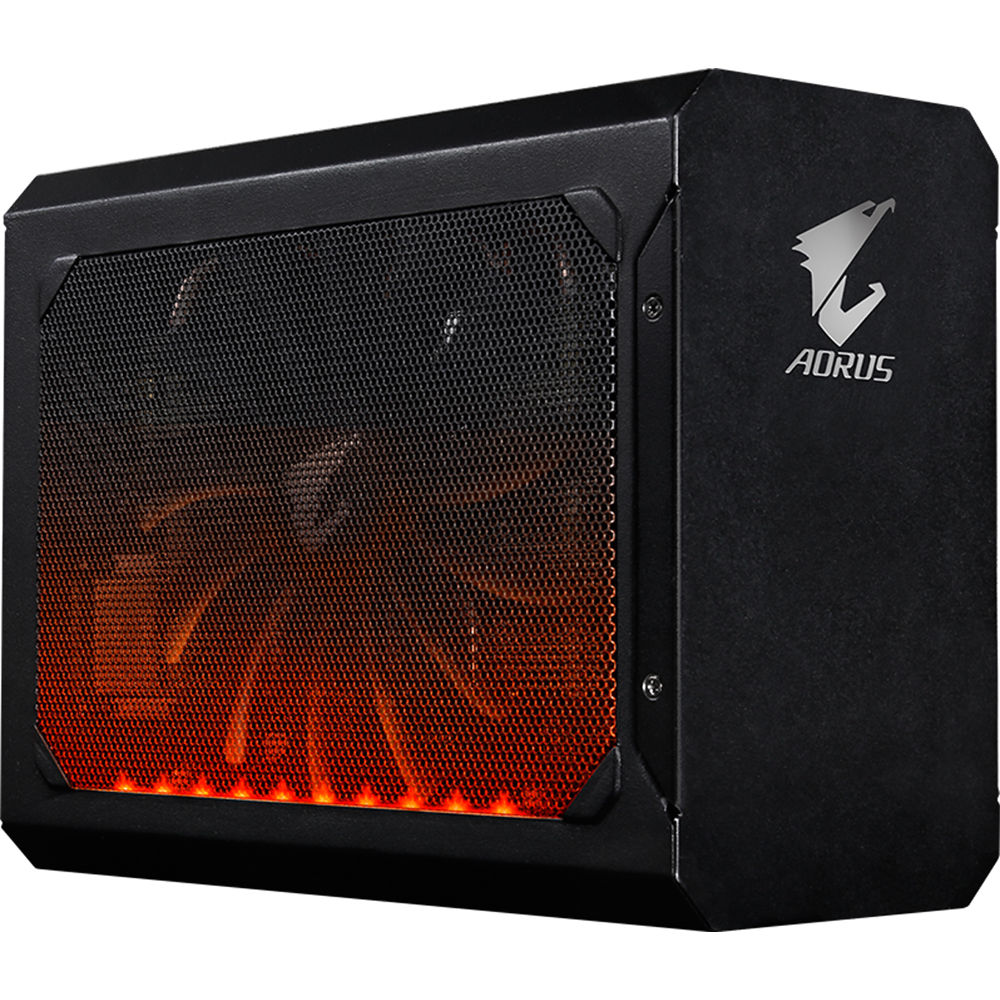
Going back to the GPU, the one we’re focusing on right now has Gigabyte’s own GTX 1070 mini. Despite the small form factor, it has the same performance as the full-sized 1070. As for ports, you get HDMI 2.0, Displayport 1.4, and two DVI ports from the GPU itself. Apart from that, we have the usual Thunderbolt 3 port, four USB 3.0 ports (one of which has quick-charge support for your phone).
Getting the Gaming Box up and running is pretty simple, just plug it into a wall socket, plug in your Thunderbolt 3 cable, download drivers from Nvidia, and your done. The Gaming box works with a huge list of Thunderbolt 3 equipped laptops with ease. As for performance, it’s about as good as it can get with an eGPU. Sure it’s not as fast as a desktop setup, but it’s only about 10-15% slower depending of course on your laptop specs. This is an impressive performance from an eGPU.
Overall, the Aorus gaming box is an easy recommendation as it is quite simply, one of the best overall external graphics cards exclosures you can buy. It’s small, portable, designed well and the performance truly delivers. Support is also not an issue as the Gaming box will work with dozens of laptops. The only issue here is upgrading the GPU down the line. Sure, the GTX 1070 is a great performer for now but in the future, it might not be up to par. The GPU can be removed but it only has support for small-sized cards like the 1070 mini inside.
2. Razer Core X
Best Performing eGPU
Pros
- Comes with Powerful 650W ATX Power Supply
- Can Charge a Laptop
- Full-Size GPU support
- Built-In Vents For Passive Cooling
Cons
- Sub-Standard Price to Performance Ratio
- No Extra USB ports
- Ethernet Chip Can Be Finnicky
GPU support: Full length cards supported| Connectivity: Thunderbolt 3 | Power Supply: 650W | Weight: 12 pounds
When it comes to laptops, Razer is known for one thing. Powerful performance in a small package, thus fueling the Corsair vs Razer debate. This is what their blade laptops were designed for. Love them or hate them, they were the first ones to popularize external graphics cards when they launched the Razer Core with their lightweight Blade Stealth laptop. They are still one of the few companies that have nearly perfected the external graphics card setup. They went back to the drawing board with their new Core X and they did not fail to deliver.
The Razer Core X is designed to look very sleek. The whole matte black aluminum frame looks very minimal and stealthy. As this is their cheaper option compared to their Core V2, there is no Chroma lighting here, a bit of a bummer for hardcore Razer fans. Apart from that, the enclosure can house even the largest graphics cards with ease. It has support for a wide variety of GPUs, ever triple slot cards. The disappointing thing here is that there are no extra USB ports on the back. Despite that, through its specifications, we recommend this as the Best Performing eGPU.
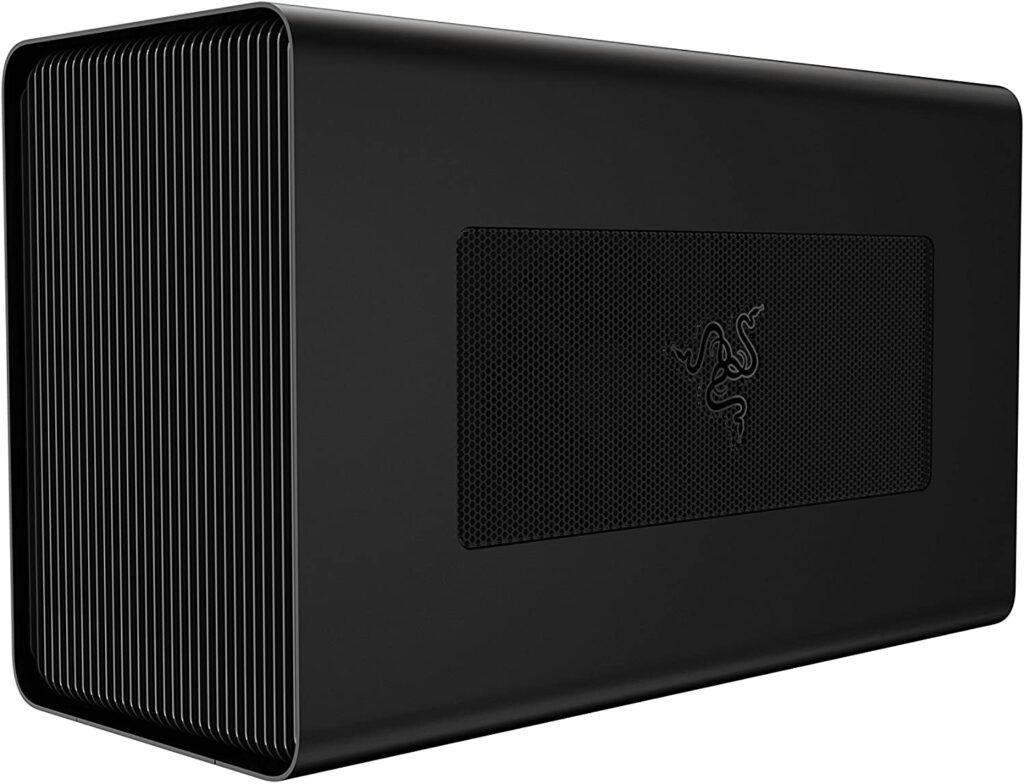
Moving on from the design let’s talk about other features. Our favorite aspect here is the huge 650W power supply which can power most of the demanding GPUs. It can even charge any laptop with 100W of output, a feature we all should appreciate. Another clever feature integrated into the design is that it has a handle on the back, so you can pull out the GPU slot in the enclosure and easily add in a graphics card.
As for support, while it officially supports most Razer laptops, it will work fine with any laptop equipped with Thunderbolt 3 (with 4 PCIe lanes of course) and software is not much of an issue. Just install the drivers for the card and you are good to go. People even got it working for their MacBooks.
All in all, for the price the Razer Core X is an excellent product that works well. It’s not even that heavy or space-consuming. The only complaint we have is the lack of USB ports. Apart from that, even though it’s a bit pricey it’s still one of our favorites only second to the great value that is the Aorus Gaming Box.
Here’s a name you probably haven’t heard before. This eGPU is called the Node from Akitio, stylized as AKiTiO. Regardless of the name, this is a surprisingly great enclosure that might even be a contender for the best versatile eGPU enclosure out there. It also has a large list of support with different GPUs and different laptops. It even has Mac support but only with AMD cards. But at nearly the same price as the Razer Core X, is the Akitio Node worth it? Let’s quickly find out.
Design-wise the Node is decent enough but nothing impressive. Like others on this list, it’s made of aluminum and has a simple box-type design. The aluminum is anodized silver. In terms of size, it’s much larger than the Core X and the Aorus Gaming Box. It even weighs a considerable 15.2 pounds (roughly 7Kg). Even though it comes with a carrying handle that helps take it around, it’s not really built for portability.
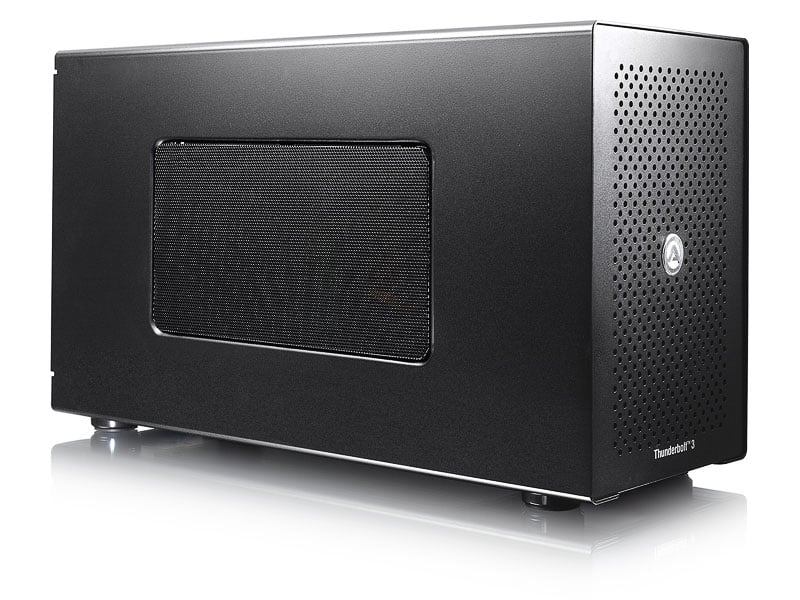
The Node has a 400W power supply which is sufficient for most GPUs. If you are not sure, you can always take a look at our guide on how to buy the right PSU for your PC. Speaking of graphics cards, it supports the most full-size graphics card. Ventilation is also not much of an issue although the internal fan can get a bit loud at full load. Apart from that, the Node works well with most laptops and a variety of GPUs. It even works with macOS, albeit only with AMD GPUs.
All in all, this another solid option for an eGPU but the problem is the size and pricing. At nearly the same price as the Core X, Razer’s offering looks better, it’s smaller and has a larger power supply. Both do not come with extra USB ports which can be disappointing. If you can find the Node at a lower price than the Core X, then it makes much more sense.
Related: Best Graphics Cards for 1440p Gaming
The ROG X2 Station 2 from ASUS works well just like other external graphics cards on this list. But since this is a ROG product, the design seems to be the highlight here. No doubt, this is the best-looking eGPU on this list. Unfortunately, when you look past the design, the ROG X2 works just like any other eGPU and it’s difficult to recommend at such a high price.
The ROG X2 sports a very aggressive design with angular styling and impressive RGB lighting. Build quality is not compromised here in any way. Simply put, this is the best-looking eGPU out there right now. The small glass window on the GPU side looks pleasant and eye-catching. The chassis itself is big and heavy but it supports full-size GPUs with no problem. It even has a few small internal fans for better ventilation compared to other enclosures. It has a 600W power supply which can easily support any high-end GPU
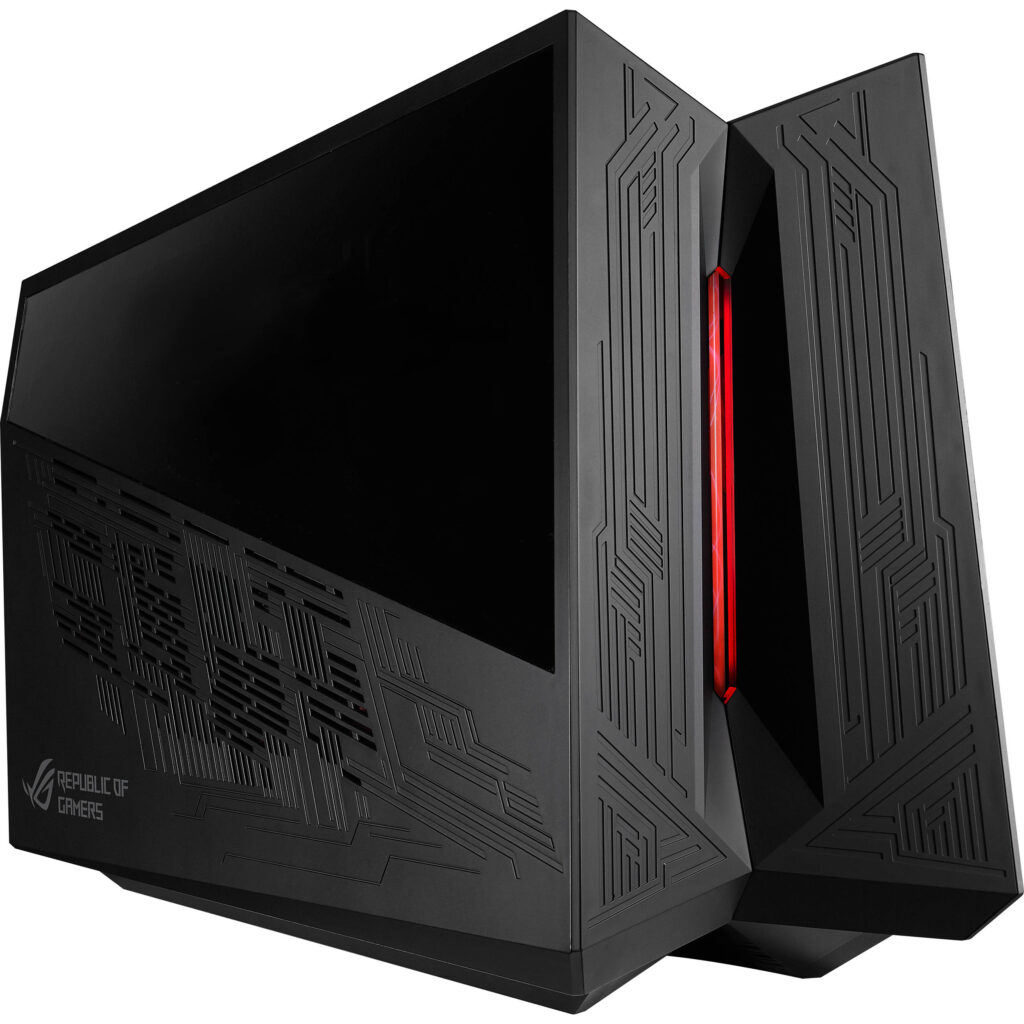
Sadly, once you look past the design, at the high price Asus is asking for this, the ROG X2 starts to fall apart as a sensible buy. Sure it works fine with most laptops and doesn’t have any issues in performance but at the high price point, it’s hard to recommend however, if you are looking to shop for the Best Looking eGPU to impress friends, the ASUS ROG XG should be your primary choice.
5. HP OMEN Accelerator
Most Feature-Rich eGPU
Pros
- Dead Silent Acoustics
- 500 W Bronze Efficiency PSU
- RJ-45 Port Included
Cons
- Quite Bulky
- High Power Draw
- USB Ports Can Be Finnicky
- Quite Expensive As Well
GPU support: Full length cards supported | Connectivity: Thunderbolt 3 | Power Supply: 500W | Weight: 17.2 pounds
The HP Omen Accelerator is big, bulky, and portable is basically thrown out the window. But we’d be lying if we said this e-GPU doesn’t look good. Not only that but it is jam-packed full of a lot of features. As much as we’d love to rank this higher, the huge form factor is seriously an issue for a lot of people. If you can look past that, this is an amazing e-GPU.
The OMEN Accelerator resembles HP’s lineup of OMEN gaming PCs. The design makes it look like a mini version of their desktop towers, just like a compact Micro-ATX case. It’s certainly unique among other eGPUs. There are also plenty of ports on the back including USB 3.0 ports, an ethernet port, a secure lock port, and of course Thunderbolt 3. It houses any full-size graphics card with no problem.
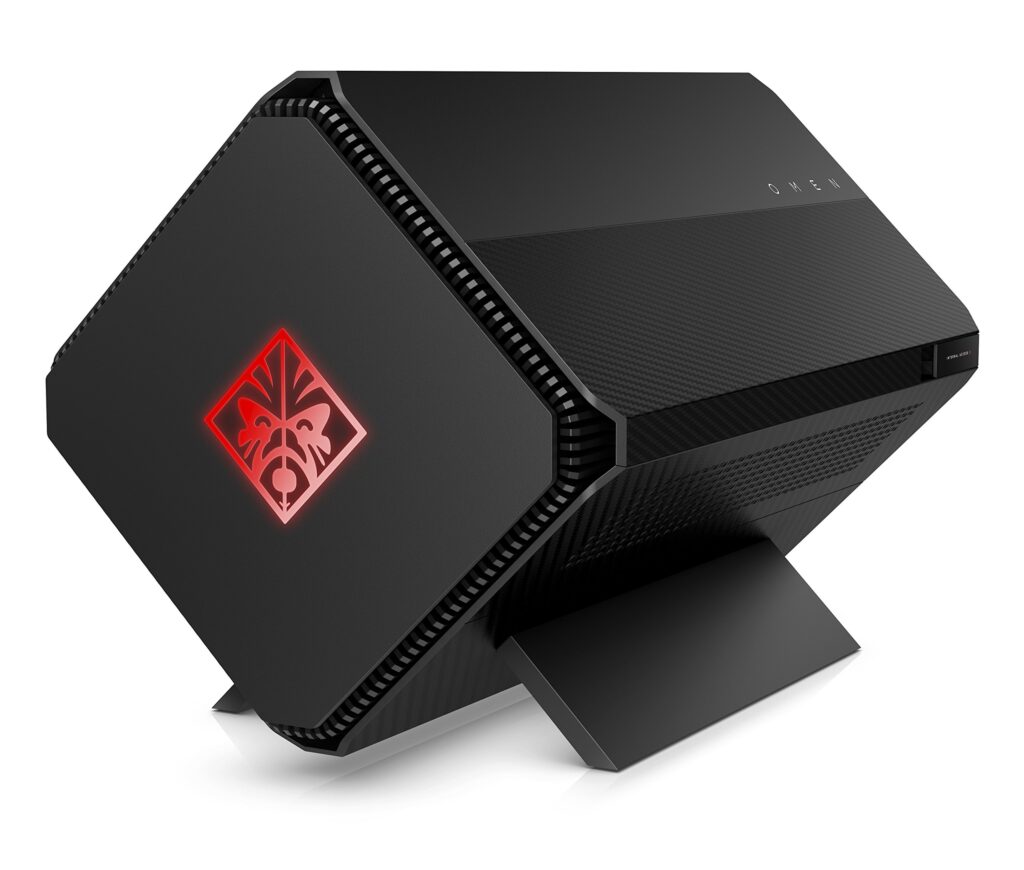
In terms of performance and compatibility, it works with a wide variety of laptops and GPUs. It even works with dual PCIe lanes Thunderbolt 3 ports, although obviously, the performance will take a huge dip. A great bonus feature here is the support for adding a hard drive or SSD. Yes, it has an internal mount for attaching a solid-state drive or mechanical hard drive. These will also connect through Thunderbolt 3.
All in all, this is a great option for taking your gaming experience to the next level. However, the huge size and power draw might be dealbreakers for some people and don’t quite allow the OMEN Accelerator to be ranked among the best feature rich eGPU solutions for every buyer.
Similar Reads: Best NVIDIA RTX 3070 Graphics Cards
Frequently Asked Questions
Frequently Asked Questions About eGPUs
Depending on your particular use-case, an external GPU might just be worth the initial investment if you really can’t find any alternatives. For people who are stuck with one laptop due to their portability or work needs, the external GPU route does make sense. However, for everyone else, it is still better to have a dedicated gaming PC or a machine with a built-in GPU such as a gaming laptop as it would be cheaper upfront than an eGPU solution.
This depends on the particular manufacturer and the particular model you are looking at. Many external GPUs do come with built-in GPUs such as the Gigabyte AORUS Gaming Box, while others such as the Razer Core X are just empty enclosures that would require you to install your own graphics card. The value proposition also varies widely between these two options, as it is sometimes cheaper to get a box with a graphics card built-in as opposed to having to purchase a card separately.
Typically yes, as the Thunderbolt 3 link is more than strong enough to carry the required bandwidth in a timely manner across the link to the laptop from the eGPU itself. Moreover, the performance loss due to PCIe lanes is usually limited to 10% or thereabouts, which is not a huge compromise in the grand scheme of things. If you are stuck with a laptop and an eGPU is your only way of gaming, then you might as well go down this route if you can afford it.
External GPUs or eGPU enclosures are niche-oriented products that require a lot of research and development, and therefore a lot of R&D budget from the companies that develop them. Furthermore, the enclosures themselves have to integrate lots of parts such as power supplies, thermal management components, ethernet chips, thunderbolt technology, and so on. Even Intel takes its share of royalties for using Thunderbolt which adds to the overall cost.
 Reviewed by
Reviewed by 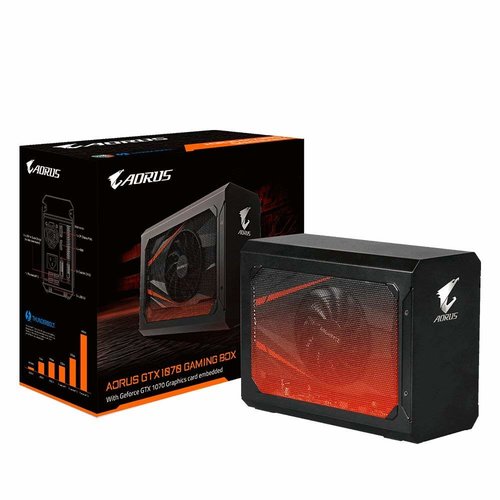
 Check Price
Check Price